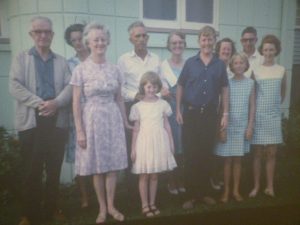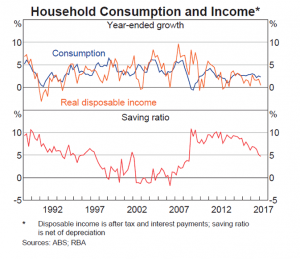Empowerment Strategies in the State Electorate of Maiwar in Brisbane’s Inner-West

Denis Bright invites discussion on the prospects for political engagement with constituents on the negative side of the income divide in Brisbane’s Inner Western Suburbs.
Attitudes to political engagement were tested through targeted interviews with residents in lower rental shared accommodation in the Toowong-Auchenflower precinct of the new marginal state electorate of Maiwar. Many properties are being offered for re-development and residents face re-location to outer suburbs and caravan parks.
As the Queensland state election approaches, opinion polling does suggest that the Labor Party is once again on the ascendency trail (Courier Mail Online 6 September 2017).
The political implications of a sharpening income divide have implications far beyond this selected precinct in Australia and overseas democracies where right wing populism has become a challenge to established political parties. The grim social statistics of Australia’s own income divide are well discussed in a recent edition of The Conversation Online (6 July 2017):
With affordable houses becoming out of reach through the gentrification of established inner-suburbs, negative levels of real wage growth and rising household debt levels, Australians are feeling more marginalized.
Feedback from interviews on the local situation in the Auchenflower-Toowong precinct provided a shocking understanding of real poverty in a growing income divide in just one part of the Inner-Western suburbs of Brisbane. These localities are usually stereotyped as being comfortably off because of the strength of its property market and the gloss of its commercial outlets.
Revisiting the Income Divide in the Auchenflower-Toowong Precincts
Some weeks ago, my AIM Network article introduced the problem of housing affordability in the Maiwar State electorate in Brisbane’s Inner-West.
Long-term gentrification of sections of the Toowong-Auchenflower precinct has not harmed Labor’s electoral prospects at state level.
Labor’s ascendency in these precincts commenced with victory in the local Mt Coot-tha electorate on 2 December 1989 which swept Premier Wayne Goss to power statewide. At state level, the current Environment Minister, the Hon Dr Steven Miles, won the seat of Mt Coot-tha from a one term LNP member in 2015.
This Mt Coot-tha electorate is now a notionally LNP seat by a narrow margin. The changes come through the addition of booths from the Indooroopilly State Electorate. Despite the swing to Labor at the 2015 election, these are largely LNP booths even after the allocation of preferences.
There is a high Green vote in Maiwar on past voting trends. Labor benefited from a strong preference flow from the Greens in 2015. Even though the allocation of preferences was not compulsory in 2015, 88.71 per cent of Green Preferences went to Labor. The combined primary votes for Labor and the Greens amounted to 53.93 per cent in Auchenflower and 56.11 per cent in Toowong.
The local electoral geography may be more complicated than such totals suggest. Pockets of social disadvantage remain and require more empathetic responses from any future majority Labor state government.
From Fond Memories to New Social Realities
My associations with the Toowong-Auchenflower precinct of the current Maiwar electorate commenced long before 2017.
 My charismatic aunt became a long-term resident in the sprawling Sylvan Road Nursing Home in the 1970s.
My charismatic aunt became a long-term resident in the sprawling Sylvan Road Nursing Home in the 1970s.
Family members would gather for festive events at her home in Graceville. Such events were cut short by the negative impact of the 1974 floods in Brisbane and the inevitable toll of ageing.
John English and Agnes English (far-left on the first and second rows) both assigned themselves to Sylvan Lodge. In the case of Agnes English, her residency extended for many years until 1980.
Occasional visits from relatives would be a welcome distraction as sisters could meet up for chats and exchanges of the latest family news in the breezy court-yards of Sylvan Lodge.
Youthful days may have been more exotic but Agnes English never complained about life in Sylvan Lodge. Through the good-will of AIM Network, her experiences can be transmitted globally. Comparisons are invited with today’s generation of occupants about the value of political involvement.
As a former commercial and local government office worker, Agnes always insisted on applying for a postal vote. The nursing home was never politically neutral. Sitting rooms for the residents were decked with Liberal Party balloons for the 1975 and 1977 federal elections. Insiders at the nursing home clearly had a profound dislike of Prime Minister Gough Whitlam who tried to make a come-back as Opposition Leader in 1977.
Forty years later, the old nursing home is now a maze of lower-cost rental units. It attracts overseas students and residents from all ages. It was a wonderful experience to chat with some of the new residents who are more than pleased to have access to low rental accommodation.
The spartan surroundings of an old nursing home offer accommodation for $100-130 per week with quite modest extra charges for internet access.
Some accommodation units are self-contained units. Other units have shared kitchen facilities (Homely Online).
Here surviving the pressures of seeking work, coping with low-income retirement, gaining whatever job might be available or completing a university course have brought a new generation of occupants to the old Sylvan Lodge Nursing Home. The site will be sold for redevelopment when the price is right (images from real-estate online). Some adjacent houses and properties in nearby streets are in a similar category.

Online advertising provides a glimpse at the style of new residential units in this locality which do not serve the budget end of the property market. Land use zoning regulations are of course a barrier to the total transformation of the precinct.
Haven of Political Non-Involvement
Residents of low-cost shared accommodation at the former nursing home site in 9 Bayliss Street and some nearby shared houses seem quite resigned to the pace of redevelopment in the Auchenflower-Toowong precinct. The shared residences are no hot-bed of political activity.
Ultimately, Labor should be the recipient of this disillusionment through preference flows from a soft Labor primary vote in the 2015 state election. There was little support for alternative LNP pro-market strategies which will fuel the property market in this precinct.
Scott Emerson is contesting Maiwar as the LNP’s shadow treasurer. Scott was a former Minister for Transport in the LNP Government of Premier Campbell Newman. His media releases on housing affordability and improved wages for lower income workers from this and other precincts are policy free zones.
Labor has the possibility of building up its primary vote by building more rapport with residents on the lower income rental market through support for trade union campaigns on penalty rates and improvements to take-home pay.
 With wage restraint, largely a product of federal LNP economic and industrial policies, it is in the interest of Labor’s state campaign to point to the zero growth of real disposable incomes in the current RBA Charts for August 2017 which afflict low income voters across Australia. Savings ratios have been in decline since the Global Financial Crisis (GFC).
With wage restraint, largely a product of federal LNP economic and industrial policies, it is in the interest of Labor’s state campaign to point to the zero growth of real disposable incomes in the current RBA Charts for August 2017 which afflict low income voters across Australia. Savings ratios have been in decline since the Global Financial Crisis (GFC).
Labor seemed to have positive support from many more comfortably off residents in the Auchenflower-Toowong precinct.
Advertising data from the local property market shows that rental and housing prices are still buoyant
Residents in comfortable jobs in both government and private sectors have the energies to savor recent state government initiatives such as prohibitions on plastic bags, attention to clean waterways, support for local authorities with local flood problems from the slopes of Mt Coot-tha and improvements to schools and federal Labor’s appeals for more child-care support.
From Wage Exploitation to Hope?
To an electorate which is looking for solutions, Labor’s pragmatic approach seems to be generating support amongst the more comfortably off constituents who are being taken through logical solutions by an ideologically flexible Palaszczuk Minority Labor Government since 2015.
If more assurance can be given by Queensland Labor to its beleaguered low-income support base, there are good prospects for Labor’s Ali King to take this redistributed seat from the LNP.
In its commitment to market forces, the state LNP does not have any policies to address the erosion of wages which is the heart of the political blues experienced by the lower income base in this Toowong-Auchenflower precinct.
These problems are a real justification for membership applications for trade unions involved in campaigns for job security, fair pay and workplace rights for the current generation of full-time and part-time workers in aged care, hospitality, manufacturing, security and delivery networks.
Queensland’s United Voice Union offers access to award wages and the protection of the remnants of penalty rates for a membership of six dollars a week for members earning less than $24,000.
 Despite the fears generated by the LNP of any deviations from the neoliberal market model, the advice from unions like United Voice is gild-edged and a cornerstone of our best Australian social values.
Despite the fears generated by the LNP of any deviations from the neoliberal market model, the advice from unions like United Voice is gild-edged and a cornerstone of our best Australian social values.
For committed trade union members, press speculation about the date of the next state is just one strand of political life.
Attacks on proactive trade unionism as a part of the solution to the income divide in Queensland are ridiculed by state LNP spokespersons with the support of occasional opinion pieces in Brisbane’s Courier Mail.
Two decades ago, I tapped out a story that said 40 per cent of Australian workers were paid-up members of a trade union. Today, the figure is less than 15 per cent. Union membership is, I am happy to say, in steep decline. Membership figures would be even less if you took out all the public servants, such as nurses, teachers and train drivers, who are bullied into joining unions they don’t really need and don’t want. (Des Houghton. The Courier Mail Online 8 July 2017).
As an alternative to a weakened role for trade unions, the positive benefits of membership for Australian both workers and overseas workers should be encouraged. The potential costs of non-membership are appalling.
A competent overseas student in one of my classes in statistics fell into the trap of working for cash wages in an upmarket restaurant in Brisbane’s Fortitude Valley entertainment district. His cash wage was less than half the award rate. The reward for the voluntary pay cut to support tax evasion by this employer was a gift of unused food. The food might otherwise have been discarded after each shift. After months of hard work at the restaurant and successful university grades, the student could afford to buy a used car. He drove around legally on an overseas licence with even less knowledge of local road rules than his awareness of industrial awards. Within weeks, the car was written off in an accident and his budget was back to square one. Recovery of the lost wages through trade union membership could of course have paid for the costs of a replacement car.
The positive trade union messages of hope need to be communicated in every language in a multinational community to residents on the negative side of the income divide in Auchenflower-Toowong and beyond. It is a more sustainable message than the case studies reviewed for this article.
 Denis Bright is a registered teacher and a member of the Media, Entertainment and Arts Alliance (MEAA). Denis has recent postgraduate qualifications in journalism, public policy and international relations. He is interested in promoting discussion to evaluate pragmatic public policies that are compatible with contemporary globalization.
Denis Bright is a registered teacher and a member of the Media, Entertainment and Arts Alliance (MEAA). Denis has recent postgraduate qualifications in journalism, public policy and international relations. He is interested in promoting discussion to evaluate pragmatic public policies that are compatible with contemporary globalization.









13 comments
Login here Register here-
Mia -
Paul -
Mary -
Alison J -
brisbanej -
OPPOSE THE MAJOUR PARTIES -
Maria H -
Lalnama -
Andrew -
S Frazer -
Kathleen -
Tristan Ewins -
Jim
Return to home pageInteresting article – especially with the personal references to an earlier Brisbane.
Hopefully these vulnerable people are aware of both their rights and responsibilities in the work force – trade union membership should assist with this.
Great article Denis on some contemporary issues that would no doubt apply across many suburbs in Australia.
Thanks for sharing the history of the area.
Solutions really are need from all sides of politics on these types of issues.
The Fair Work Ombudsman site can also provide readers with information about working entitlements etc. However, without a union or legal representative (depending on the nature of the employee / employer relationship) raising such issues with employers can be very difficult.
It is a great area of Brisbane to live in with proximity to city, universities etc so it will always be competitive with rents so long as the population continues to grow.
Great article Denis – sure this pertains to many other areas as well. Interesting read as always.
I enjoyed this piece very much – the mix of old reminiscence and contemporary reporting was engaging. Another wonderful article from Denis Bright!
Thanks for another great article Denis. An interesting discussion and local story.
This area sounds ripe for the picking by independents at any election in the near future.
The Labor Maiwar Campaign has reached into every suburb of the electorate to listen to the concerns of residents. The candidate, Ali King has gained a lot of support from people who share her values. She is well placed to be a voice for the electorate on social justice, workplace and neighbourhood development issues.
Interesting article Denis regard the local area & the changing environment we live in. We need a diversity of people & various types of housing available to all in our society in all,our suburbs . People with low incomes should not be forced to live in the outer suburbs with poor infrastructure , including transport. Labour & Liberal need to take this into account
It’s important that people from non English speaking backgrounds and young people are aware of their entitlements and are not exploited.
Interesting look at the state of play in this marginal seat. Ali King has been very active in the electorate, and is working hard to deliver meaningful change for this community. She definitely has my vote.
Great thoughts – lots of inequality facing the inner west of Brisbane.
It was always the same here in Melbourne too ; many nursing homes ‘guiding’ residents to vote Liberal ; Though most of what can be done is at a Federal level. Nonetheless State Governments have the choice of investing in public housing and infrastructure. The danger is that after investment in infrastructure areas my be gentrified. Again perhaps big investments in public housing are necessary to counter that.
How reassuring to have an article with empathy for poorly paid workers who lock themselves out of the benefits of trade unions: Great interviews Denis